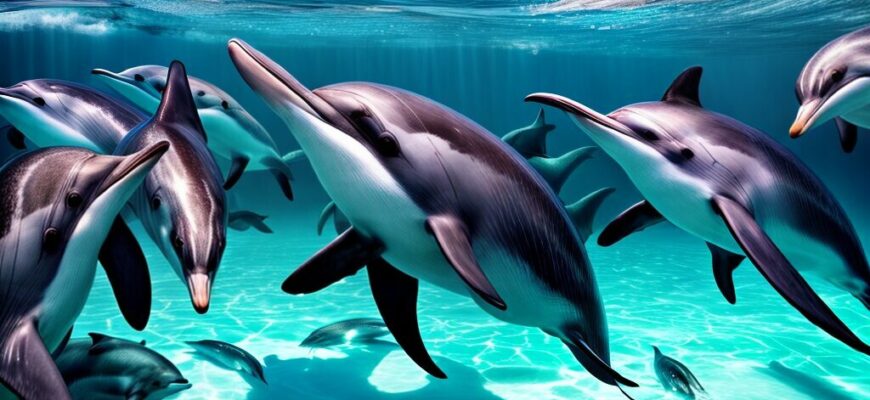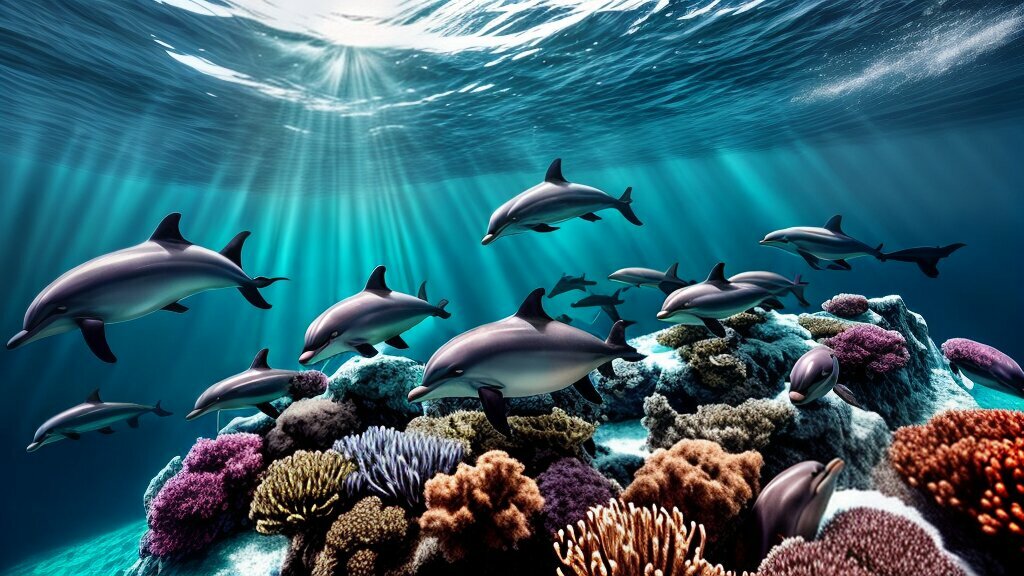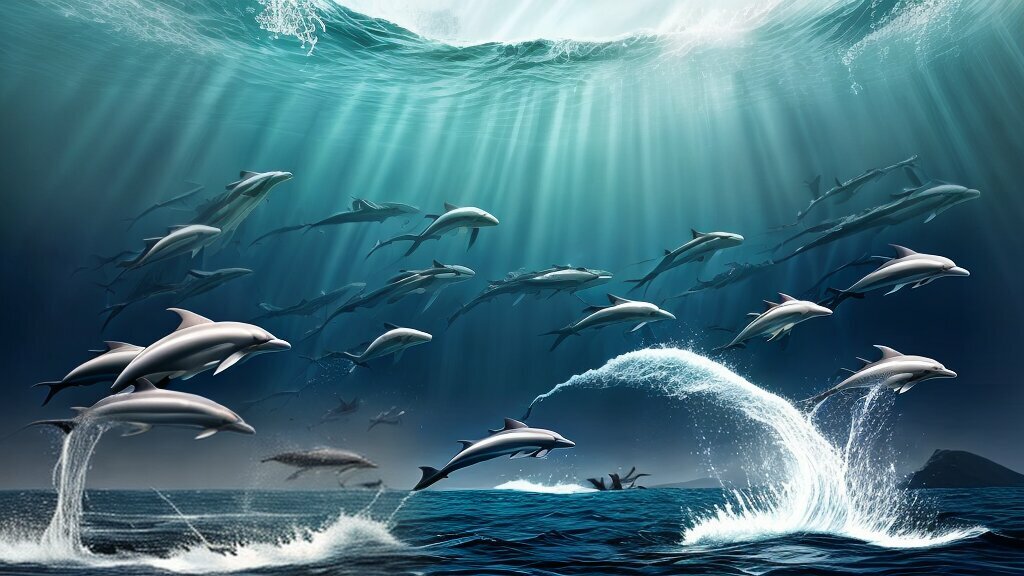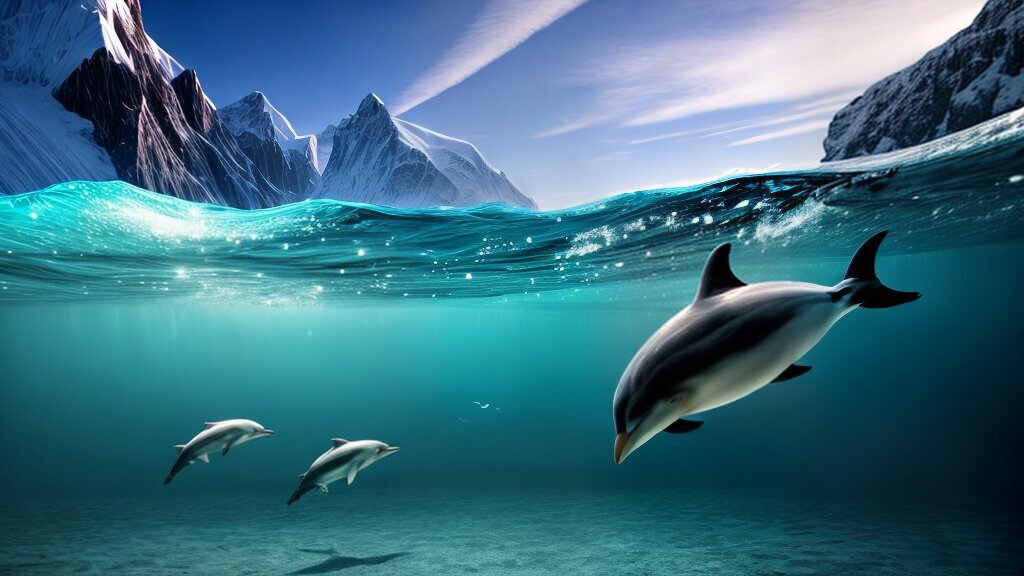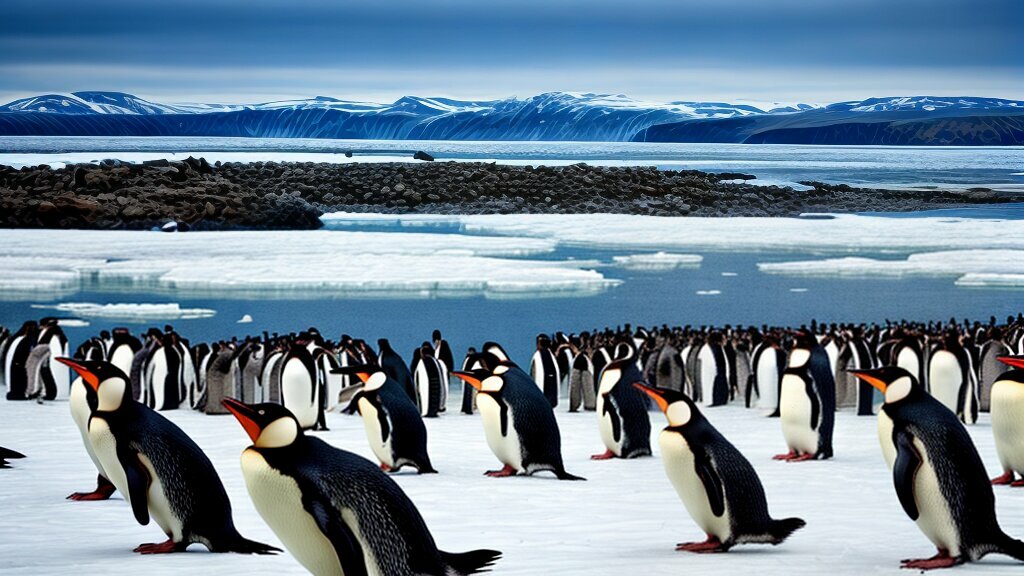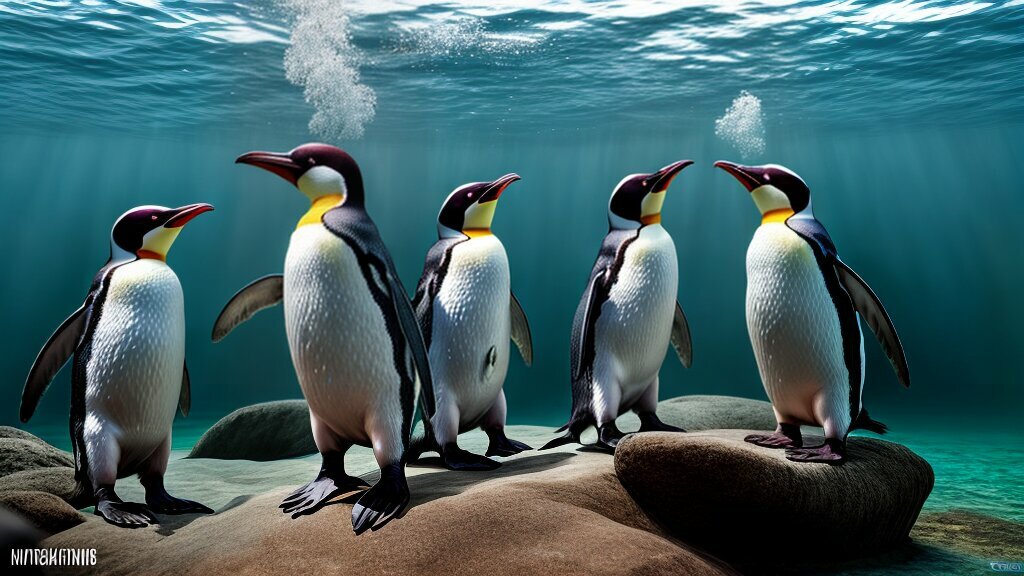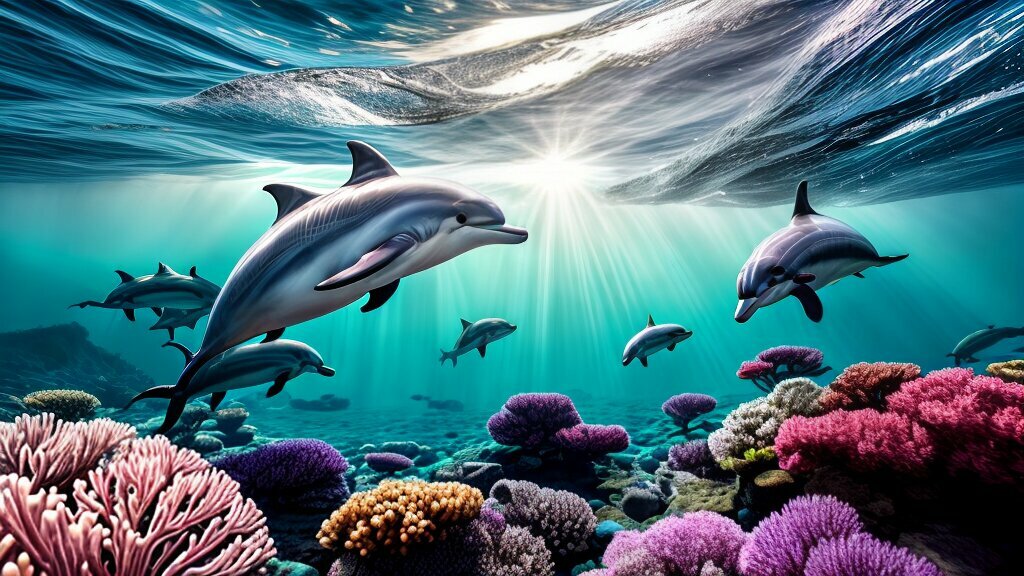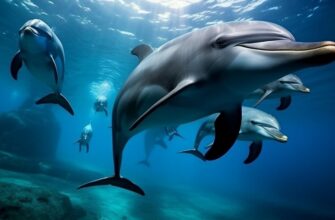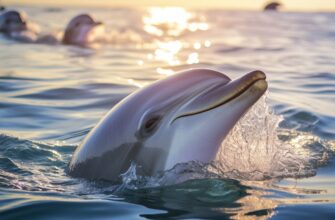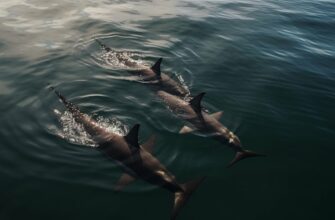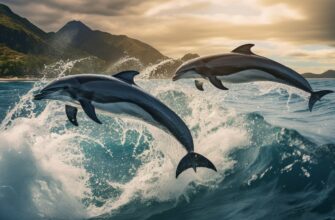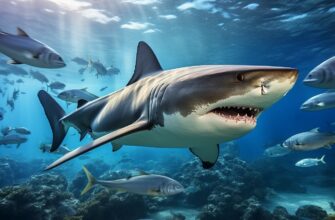Have you ever wondered if dolphins eat penguins? It’s a common question, and one that has sparked the interest of many marine enthusiasts. In this article, we will take a deep dive into the world of these aquatic creatures and uncover the truth behind this popular mystery.
Contrary to popular belief, dolphins are not known to eat penguins. While dolphins are opportunistic predators and will eat a variety of small fish and squid, penguins are not typically a part of their diet. However, there have been rare occasions where dolphins have been observed preying on penguins, which has led to some confusion and speculation.
- Key Takeaways:
- Dolphin and Penguin Relationships in the Ocean
- Dolphin Communication
- Penguin Social Behavior
- Dive into Dolphin Hunting Strategies
- Penguin Diet and Dolphin Behavior
- Killer Whales: The Penguins’ Predator
- A Closer Look at Penguin Adaptations
- Exploring Dolphin Feeding Habits
- Conclusion
- FAQ
- Q: Do dolphins eat penguins?
- Q: What are the relationships between dolphins and penguins in the ocean?
- Q: How do dolphins hunt and interact with penguins?
- Q: How does the diet of penguins relate to dolphin behavior?
- Q: Do killer whales eat penguins?
- Q: How do penguins adapt to avoid predation by dolphins?
- Q: What are the feeding habits of dolphins?
Key Takeaways:
- Dolphins are not known to eat penguins, but there have been rare occurrences where they have been observed preying on them.
- Dolphins are opportunistic predators and will eat a variety of small fish and squid.
- Penguins have unique adaptations that help them evade dolphin predation.
Dolphin and Penguin Relationships in the Ocean
Despite being two of the most beloved marine animals, dolphins and penguins have a complex relationship in the ocean. While they may appear friendly with each other in captivity, this is not the case in their natural habitat.
As predators and prey, dolphins and penguins engage in a never-ending dance of life and death. Dolphins are known to hunt penguins, especially when their preferred prey is scarce. However, penguins are quick to detect the presence of dolphins and will dive into the water to avoid them.
Interestingly, some species of penguins have evolved unique adaptations to avoid dolphin predation. For example, the Adelie penguin has been observed to form large groups when approaching the water’s edge, making it more challenging for dolphins to single out an individual penguin for attack.
Despite their differences, both dolphins and penguins are highly intelligent creatures with complex social structures. They are also both highly adapted to their marine environments and play critical roles in maintaining the delicate balance of the ocean ecosystem.
Dolphin Communication
Dolphins are famous for their complex communication and social behavior. They use a variety of vocalizations and body language to communicate with each other, including whistles, clicks, and even leaping out of the water.
Researchers have observed that dolphins also have individual “signature whistles” that they use to identify themselves to others in their pod. This behavior suggests that dolphins have a sense of self-awareness and a deep understanding of their social relationships.
Penguin Social Behavior
Penguins, too, have complex social behaviors and communication methods. They use a variety of vocalizations, body movements, and displays to communicate with each other, including trumpeting, braying, and preening.
Their social structures are highly organized, with strict hierarchies and well-defined roles within their colonies. For example, male emperor penguins will huddle together in large groups to share warmth during the long Antarctic winters, taking turns moving to the center of the group to avoid the harsh outer edges.
In conclusion, the relationships between dolphins and penguins in the ocean are complex and multifaceted, involving predation, communication, and social behavior. While they may seem like unlikely friends, these two species play critical roles in maintaining the health of the ocean ecosystem.
Dive into Dolphin Hunting Strategies
When it comes to hunting, dolphins are known for their strategic approaches and impressive coordination.
When hunting for fish, they often work together to herd their prey into a tight group so that they can take turns swimming through and snatching up as many fish as possible. But what about their interactions with penguins?
Some experts suggest that dolphins do indeed hunt penguins, while others argue that it is not a common occurrence. One theory is that dolphins may be less likely to target penguins due to their dense feathers and blubber, which makes them less nutritious and more difficult to digest than other prey.
However, research has shown that dolphins have been observed attacking and killing penguins, particularly in areas where their preferred prey is scarce. In fact, one study found that dolphins in Argentina’s Patagonia region were preying on over 1,000 Magellanic penguins per year.
So how do dolphins go about hunting penguins? It’s been observed that dolphins will often work together to corral a group of penguins into a tight space, making it easier to pick off individual prey. They may also use their speed and agility to chase down individual penguins in open water.
It’s important to note that not all dolphin populations have been observed preying on penguins, and some researchers believe that certain populations may have adapted to different diets due to regional differences in prey availability and competition.
As with most predator-prey relationships in the ocean, the interactions between dolphins and penguins are complex and depend on a variety of factors.
“Dolphins have been observed attacking and killing penguins, particularly in areas where their preferred prey is scarce.”
While some populations of penguins have evolved adaptations to avoid predation by dolphins, such as swimming in large groups or seeking refuge in rocky areas, others may not be as successful.
In the next section, we will explore the relationship between the diet of penguins and the behavior of dolphins, shedding further light on this fascinating topic.
Penguin Diet and Dolphin Behavior
While it is known that dolphins are voracious predators, the question of whether they eat penguins is still shrouded in mystery. To better understand their interactions, it is important to examine both the diet of penguins and the behavior of dolphins.
| Penguin Diet | Dolphin Behavior |
|---|---|
| Emperor penguins primarily feed on fish and krill, while African penguins consume anchovies, sardines, and other small fish. Gentoo penguins predominantly eat krill, squid, and small fish. | Dolphins have a varied diet, with some species preferring fish, while others may consume squid and even octopus. Their dietary choices are influenced by factors such as the availability of prey, water temperature, and depth. |
Despite the availability of penguins as prey, research has shown that dolphins do not frequently hunt or consume penguins. This is likely due to the fact that other prey species are more abundant and easier to catch.
“While dolphin predation on penguins has been documented, it is not a common occurrence. The preference for other prey species and the unique adaptations of penguins likely play a role in their survival.”
In addition, penguins have evolved unique adaptations to evade predation by dolphins, such as swimming in large groups or remaining near rocks and icebergs where it is more difficult for dolphins to maneuver.
Overall, while it is possible for dolphins to consume penguins, it is not a frequent occurrence. The diet of penguins and the behavior of dolphins play a significant role in their interactions, with adaptations and availability of prey impacting their survival.
Killer Whales: The Penguins’ Predator
While dolphins may not eat penguins, there is another marine mammal that poses a significant threat to these flightless birds: the killer whale.
Killer whales, also known as orcas, are apex predators of the ocean and have a diverse diet that includes fish, seals, and sea lions. However, they have also been known to prey on penguins, particularly in the Antarctic region.
One study found that killer whales are responsible for up to 65% of Adelie penguin deaths in some areas, and their predation can have a significant impact on local penguin populations.
Interestingly, killer whales have been observed using unique hunting strategies when targeting penguins. They will often create waves in the water to dislodge penguins from ice floes, making it easier to catch them.
“Killer whales are responsible for up to 65% of Adelie penguin deaths in some areas.”
This predatory behavior of killer whales highlights the complex relationships that exist between marine mammals in the ocean and the impact they can have on each other’s populations.
A Closer Look at Penguin Adaptations
Penguins may seem like easy prey for dolphins, but these aquatic birds have a few tricks up their sleeves to avoid becoming a tasty snack. One of their key adaptations is their ability to dive deep into the ocean to escape the reach of dolphins. In fact, some penguins can reach depths of up to 500 feet!
Another adaptation that helps penguins evade dolphin predation is their coloring. The black and white coloration of penguins makes them harder to spot from below the surface, which can give them an advantage in avoiding detection by dolphins.
Penguins also tend to travel in larger groups, which can be a useful defense mechanism against predators like dolphins. By sticking together, they make it more difficult for a dolphin to isolate and catch an individual penguin.
While these adaptations may help penguins avoid being hunted by dolphins, they are not foolproof. Dolphins are intelligent predators that are adaptable and always on the lookout for their next meal. As such, penguins must constantly be on guard and ready to deploy their survival strategies when encountering these marine mammals.
“Penguins may seem like easy prey for dolphins, but these aquatic birds have a few tricks up their sleeves to avoid becoming a tasty snack.”
Exploring Dolphin Feeding Habits
While penguins are not a primary food source for dolphins, these highly intelligent marine mammals have a diverse diet that includes a variety of fish, crustaceans, and squid. Their preferred prey varies depending on the species and location.
Dolphins are known to use a variety of hunting strategies to catch their prey, including cooperative hunting, where they work together to corral and capture fish. They also use echolocation to locate their prey and may employ high-speed chases to catch fast-swimming fish.
In addition to their hunting habits, the feeding habits of dolphins can also vary based on environmental factors, such as changes in temperature or water depth. For example, some dolphin species may shift their diets seasonally to take advantage of available food sources.
When it comes to interactions with penguins, dolphins may hunt them in certain circumstances, such as when other food sources are scarce. However, penguins have a variety of adaptations that help them evade dolphin predation, such as their agile swimming abilities and their tendency to congregate in large groups.
Overall, while dolphins may occasionally hunt penguins, they are not a primary food source for these intelligent marine mammals. Instead, dolphins have a diverse diet that includes a range of marine life, and their feeding habits can vary based on a variety of environmental factors.
Conclusion
After a thorough exploration of the question, “Do dolphins eat penguins?” we have uncovered some fascinating insights into the complex relationships between these two marine species.
While it is true that dolphins have been observed preying on penguins in certain circumstances, it is not a common occurrence. These intelligent mammals have a varied diet and typically prefer to hunt smaller fish and squid.
Furthermore, penguins have adapted unique strategies to evade dolphin predation, such as swimming in groups and keeping close to shore.
Overall, it is important to remember that the natural world is full of complexity and diversity. The interactions between marine species are governed by a delicate balance that is still being uncovered and explored by scientists.
FAQ
Q: Do dolphins eat penguins?
A: Dolphins are not known to eat penguins. While dolphins and penguins may inhabit the same oceans, their dietary preferences and hunting strategies differ. Dolphins typically feed on fish, squid, and other marine creatures, while penguins primarily consume fish and krill. Although there have been rare instances of dolphin-penguin interactions, such as dolphins herding penguins, these interactions are not driven by predation.
Q: What are the relationships between dolphins and penguins in the ocean?
A: Dolphins and penguins have distinct relationships in the ocean. Penguins are prey to various predators, including killer whales, sharks, and seals, but dolphins are not typically considered a threat to penguins. While dolphins may occasionally encounter penguins, their interactions are often non-predatory and can involve dolphins passing by or investigating penguin colonies out of curiosity.
Q: How do dolphins hunt and interact with penguins?
A: Dolphins employ hunting strategies such as herding and corralling fish, but these tactics are not commonly observed in interactions with penguins. When dolphins encounter penguins, their behavior is typically non-aggressive and more focused on exploration rather than predation. Dolphins may display curiosity towards penguins, but instances of dolphins actively hunting or preying upon penguins are rare.
Q: How does the diet of penguins relate to dolphin behavior?
A: Penguins primarily feed on fish and krill, which are not the preferred prey of dolphins. Dolphins often target fish species that inhabit different areas or depths than those frequented by penguins. Therefore, the dietary preferences of dolphins are not closely related to penguin behavior, and the two species do not overlap significantly in terms of their prey preferences.
Q: Do killer whales eat penguins?
A: Yes, killer whales, or orcas, are known to prey on penguins. Unlike dolphins, killer whales are apex predators and have a diverse diet that includes various marine mammals, fish, and seabirds. Killer whales have been observed hunting and feeding on penguins, particularly in regions where penguins are abundant.
Q: How do penguins adapt to avoid predation by dolphins?
A: Penguins have evolved several adaptations that help them evade predation by dolphins. These adaptations include their streamlined body shape, which allows them to swim quickly and maneuver efficiently underwater. Penguins also typically inhabit different areas than dolphins, opting for colder waters near the Antarctic region where few dolphin species are found. Additionally, penguins often gather in large colonies on land, minimizing their vulnerability to predation while they breed and care for their young.
Q: What are the feeding habits of dolphins?
A: Dolphins are opportunistic feeders that consume a variety of prey, including fish, squid, and crustaceans. They exhibit complex feeding behaviors, such as cooperative hunting and strand feeding, where they push fish onto shorelines to make capturing them easier. Dolphin diets can vary depending on their habitat and prey availability, and they are known to adapt their feeding strategies to different environments and prey types.

